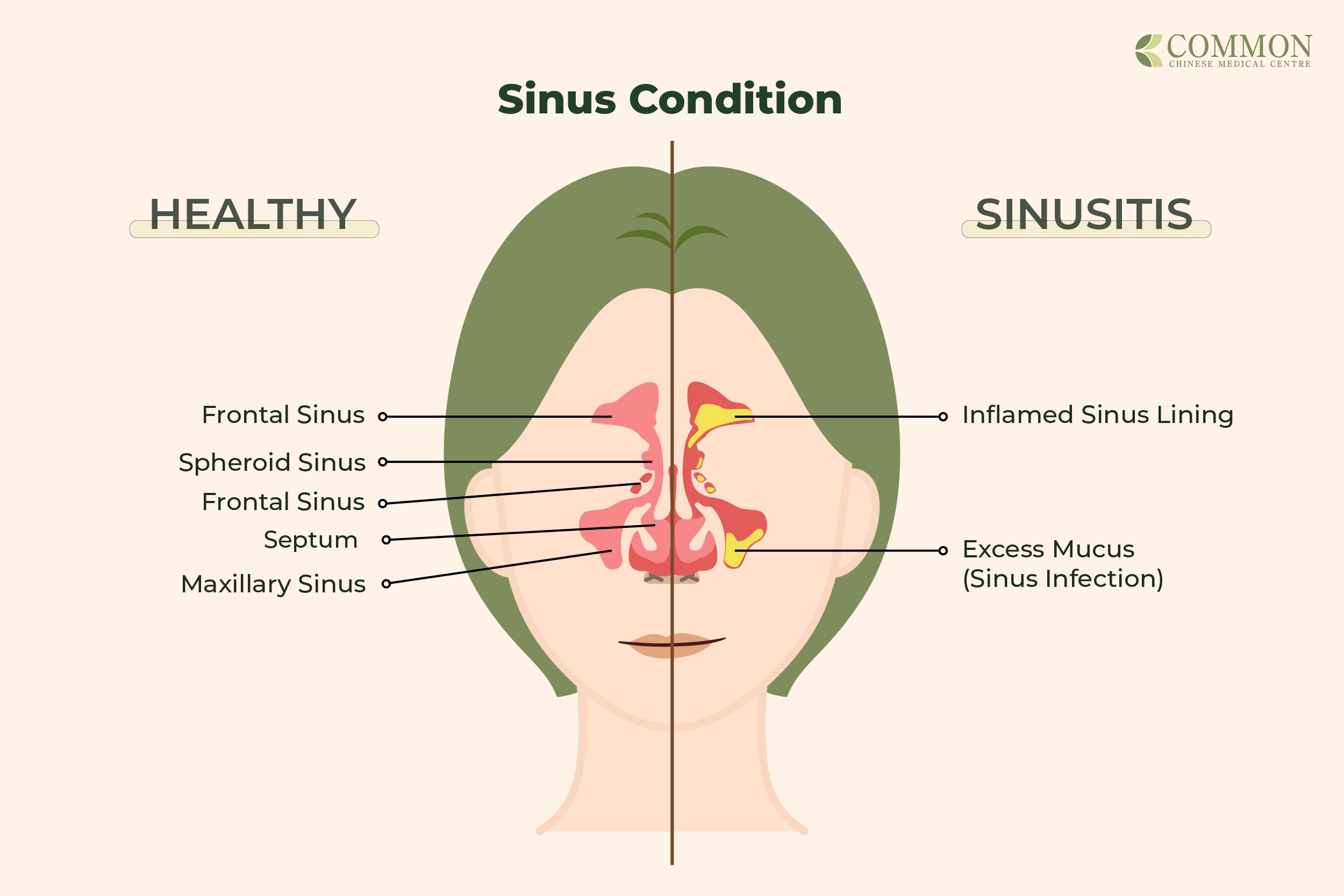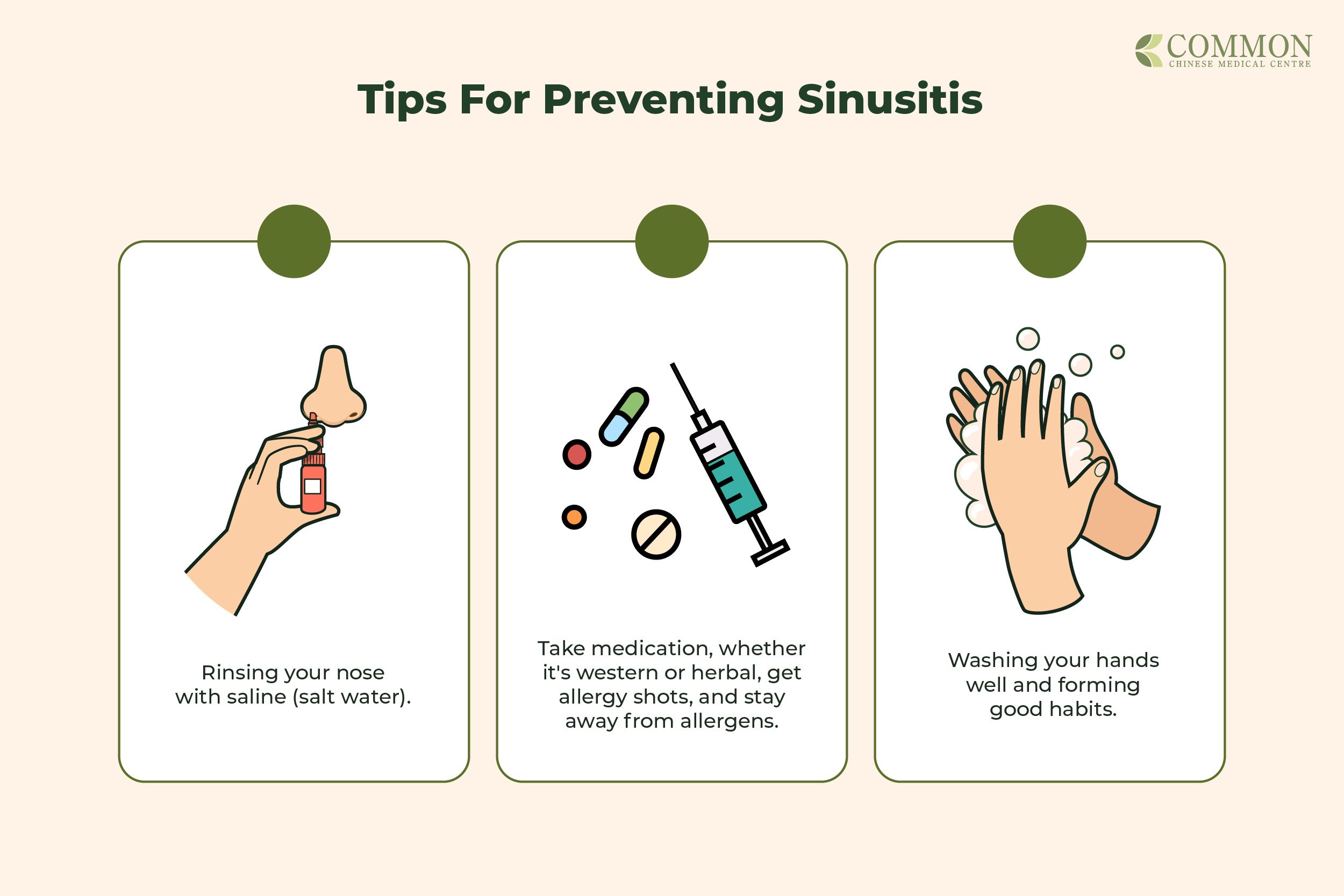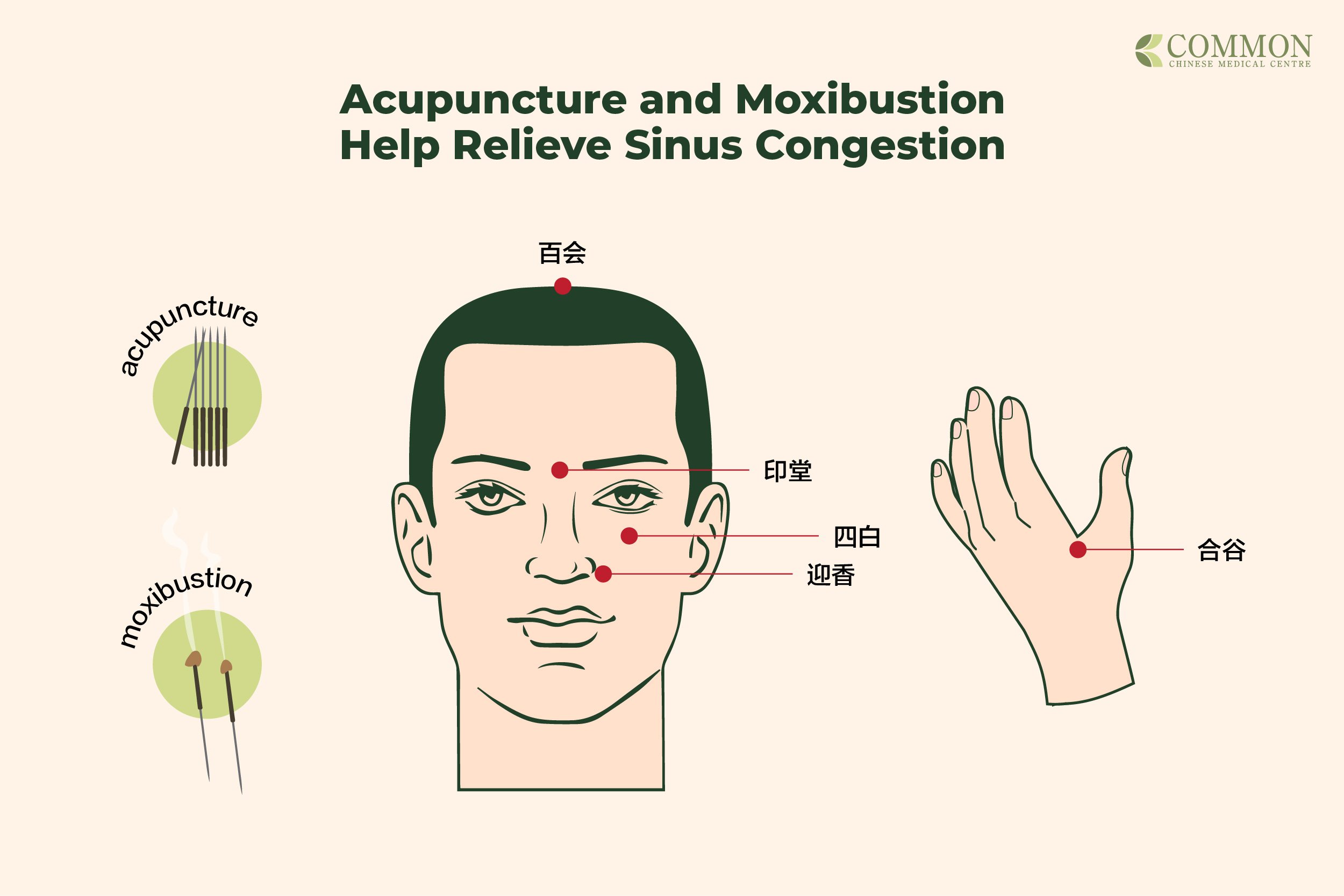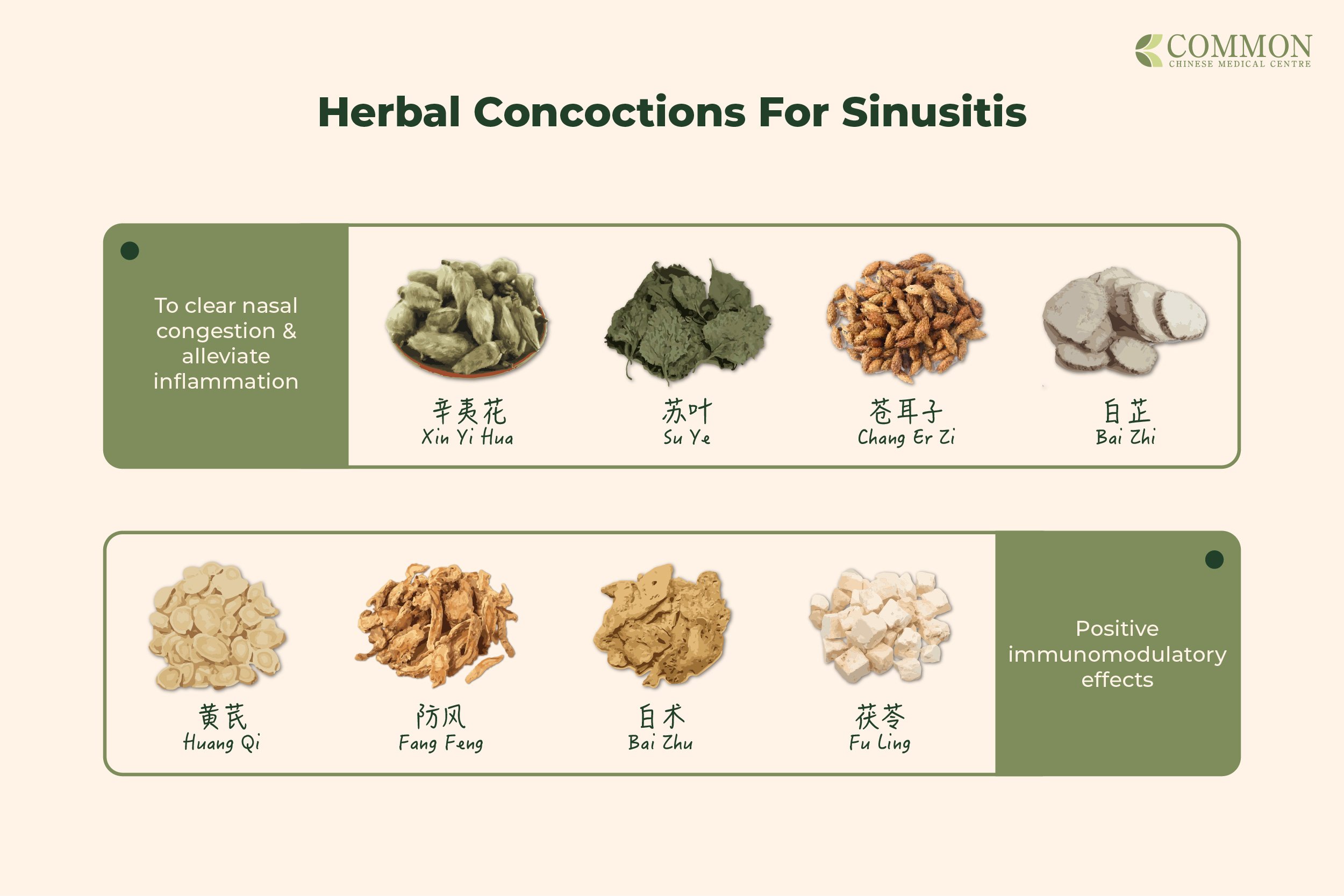Comprehensive Sinusitis Management with Traditional Chinese Medicine (TCM)
Sinusitis is an inflammation, or swelling, of the tissue lining your sinuses. Structures inside your face called sinuses are usually air-filled. Allergies, viral infections, and bacterial infections can aggravate them to the point where they become clogged and fluid-filled. In addition to other symptoms including a stuffy nose and facial pain and pressure, this can also induce nasal congestion and headache.
Another name for sinusitis is rhinosinusitis.
Types of Sinusitis:
Acute: Acute sinusitis signs, like congestion, discharge, facial pain, and smell loss, persist for under four weeks, often caused by cold-causing viruses.
Subacute: Subacute sinusitis symptoms last four to 12 weeks.
Chronic: Chronic sinusitis symptoms last at least 12 weeks. Bacteria are usually the cause.
Recurrent Sinusitis: Recurrent acute sinusitis symptoms come back four or more times in one year and last less than two weeks each time.
Causes of Sinusitis:
Sinusitis isn't a solitary foe; it often arises due to various factors:
Infections: Bacterial or viral infections like the Common Cold or Influenza can trigger an immune response and inflammation in the sinus cavities.
Allergies: Sensitivity to allergens like pollen, dust, or pet dander can lead to sinusitis.
Structural Abnormalities: Structural issues such as a deviated septum or nasal polyps can impede proper drainage.
Common Symptoms of Sinusitis:
Thick, discolored mucus from the nose, known as a runny nose
Mucus down the back of the throat, known as postnasal drip
Blocked or stuffy nose, known as congestion
Pain, tenderness and swelling around the eyes, cheeks, nose or forehead
Reduced sense of smell and taste
Bad breath or loss of smell
Cough, often worse at night
Fatigue and general feeling of being ill
Fever
Similar Conditions:
Rhinitis: Primarily an allergic response to specific allergens, resulting in symptoms related to nasal and eye irritation.
Chronic Migraine: Often present with recurrent episodes of headache, typically affecting one side of the head and associated with other neurological symptoms.
Managing Sinusitis: The Unseen Impact
Beyond the immediate discomfort, if left untreated, it can lead to long-term complications. Unmanaged sinusitis can trigger chronic inflammation, weakening the immune system and affecting overall health. This makes addressing sinusitis an essential step towards maintaining well-being.
Is sinusitis contagious?
Sinusitis is not infectious in and of itself. However, the bacteria and viruses that might cause it are. Keep in mind to wash your hands properly, stay away from other people if you're unwell, and cough or sneeze into your elbow.
Can sinusitis be prevented?
Depending on the cause, there are a few ways to reduce your risk of getting sinus infections, including:
Rinsing your nose with saline (salt water) as directed by your provider.
Taking steps to prevent allergies. This includes medications, western or herbal, allergy shots and avoiding your known allergy triggers (like dust, pollen or smoke).
Establishing good handwashing and other habits that reduce your risk of getting sick with infectious diseases.
TCM Treatments: A Comprehensive Solution
A meta-analysis has yielded compelling findings regarding the efficacy of acupuncture and moxibustion in the management of sinusitis. The analysis encompassed both standalone and adjunctive therapies in conjunction with conventional treatments.
Acupuncture Effectiveness:
The meta-analysis reveals that acupuncture, whether administered as a standalone treatment or in combination with conventional approaches, was linked to significantly improved Treatment Efficacy Rate (TER) and lower Visual Analog Scale (VAS) scores compared to conventional treatment alone, indicating substantial relief and symptom reduction. In another study, acupuncture stimulation of the sphenopalatine ganglion significantly improved nasal congestion in subjects with hypertrophic inferior turbinate or chronic sinusitis without polyps, compared with sham acupuncture.
Acupuncture and Moxibustion has had success in managing sinusitis.
It may inhibit the release of histamine, which is involved in allergic reactions, and downregulate the inflammatory pathways and TSLP protein expression, which helps reduce inflammation in the sinus tissues.
Electroacupuncture appears to work synergistically with interleukin-10, an anti-inflammatory cytokine. This cooperation can help reduce inflammation and promote healing. By maintaining or enhancing interferon-γ levels, electroacupuncture may contribute to mitigating mucosal damage caused by inflammation.
Acupoints: Points commonly used include 百会,印堂,迎香,四百,合
3. Herbal Concoctions:
Herbs like Xin Yi Hua 辛夷花, Su Ye 苏叶, Cang Er Zi 苍耳子, Bai Zhi 白芷 are used to clear nasal congestion and alleviate inflammation. Huang Qi 黄芪, Fang Feng 防风, Bai Zhu 白术, Fu Ling 茯苓 have positive immunomodulatory effects.
What you can expect at Common TCM Clinic
Common TCM Clinic focuses on addressing root causes.
Acupressure exercises and self help lifestyle tips will be imparted to provide sustainable relief rather than temporary fixes.
With experienced physicians, TCM treatment plans are tailored to individual patterns of disharmony, optimising results.
Common TCM Clinic integrates ancient wisdom with contemporary research, ensuring evidence-based practices.
Recovery Journey:
Reduced sinus congestion
Alleviation of pain
Decreased recurrence of sinusitis episodes
-
Advisory for Using Traditional Chinese Medicine For Sinusitis Management
Individuals who are pregnant or planning to become pregnant should consult with their healthcare provider and inform the physician of their pregnancy, as certain acupuncture points may be contraindicated during pregnancy.
Most importantly, do your research and seek advice from reputable professionals for an elevated healing experience. For more information, visit our website to learn more about our treatments and physicians or book an appointment. Your well-being is our priority, and we are here to support you on your journey towards better health.
Disclaimer: This article provides general information for understanding sinusitis and the potential benefits of Traditional Chinese Medicine (TCM) treatments. It is important to note that these guidelines should not replace individualized medical advice or consultation with a qualified healthcare professional.




